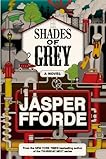 Kitchen Chinese: A Novel About Food, Family, and Finding Yourself by Ann Mah
Kitchen Chinese: A Novel About Food, Family, and Finding Yourself by Ann MahI really should have known better. I thought it would be a novel about food -- it's called Kitchen Chinese and was written by a food writer. But it's actually chick lit. Reading the back cover, I realize I should have seen the signs: "Isabelle Lee things she knows everything about Chinese cuisine. . . . Now, in the wake of a career-ending catastrophe, she's ready for a change -- so she takes off for Beijing to stay with her older sister, Claire. . . . . In the midst of her extreme culture shock, and the more she comes to learn about her sister's own secrets, Isabelle can't help but wonder whether coming to China was a mistake -- or an extraordinary chance to find out who she really is." Sister's secrets? Discovering yourself? This could be an interesting, insightful book, but it could also be incredibly cheesy chick lit.
It's the latter.
It's pretty decent as chick lit goes, but chick lit nonetheless. It's predictable, a quick read, and best when it sticks to food and personal revelations rather than dating, broad assertions about the nature of cross-cultural experiences, and sibling rivalries. (I correctly guessed that the writer is an only child simply from the way she wrote about the main character and her sister. It was just too discombobulated a mess of rivalry, grudges, lack of communication, and yet also intuitively knowing what the other needed and thought.)
Ann Wah admirably figures out how to write bilingual dialogue, explaining important phrases but not bogging down comprehension with a dual system. I got a little annoyed that the pinyin had no tones, but that's not Wah's fault, and for most English readers I dare say it's less distracting to get romanizations of Chinese without little lines above each syllable.
Wah also shines when she talks about Chinese food, which actually made me hungry for Chinese street food more than once. And this may be the first book I've ever read that truthfully explains the awkwardness and avoidance that leads to really unacceptable ways of breaking up with someone. As in, I had total empathy for the text messager in the story, even though I still know it's a despicable thing to do.
However, the book felt too autobiographical -- too many details that didn't make sense to put it unless it was just an observation the author personally made and wanted to include. Yet at the same time, the book was too fake. Sometimes the dialogue was awkward because it tried to explain things without making a proper aside (like when the main character's best friend in China explains to her that she rides a bike to work -- gah!! main character would know that already, so it shouldn't be dialogue, but part of the narration). Or the narration sounded weird because it became too colloquial/talky, as when the main character explains that in middle school, "Shannon and I soon became BFFs." Really? "BFFs"?
But the stylistic awkwardness would be forgiven if it weren't for the totally lame love interest plot. I give Wah points for not even trying to pretend that she's come up with something suspenseful -- she makes it painfully obvious who the main character is going to end up with moment she meets him. It's just too too "meet cute" not to end with some ridiculous mushy dialogue at the back of the book. But it did annoy me that the reader is introduced to the romantic interest on page 68, I figured out who he was by page 69, and the main character doesn't figure it out until page 204. I mean, being a little dense is one thing, but if you know a guy named Charlie is going to be at an event that is honoring a guy named Charles who you know works in the SAME OFFICE, don't you think you might, just might, put 2 and 2 together? What works in crappy romantic comedy movies doesn't work quite as well in first person narratives because narrator has to both give all the necessary information and be stupid enough not to know what's going on.
But all in all, Kitchen Chinese was enjoyable enough, especially for its descriptions of China and Chinese food. It's not particularly thought provoking, but it's worth reading over a weekend or on the beach. As long as there's a Chinese restaurant nearby to fulfill your cravings.


